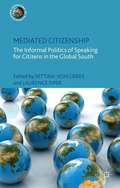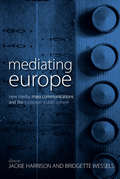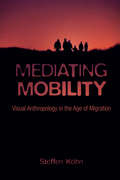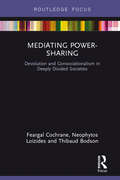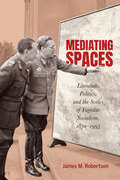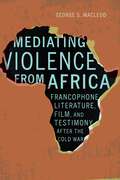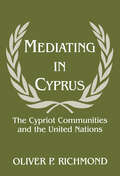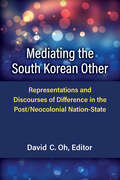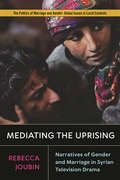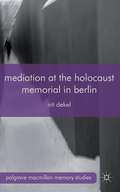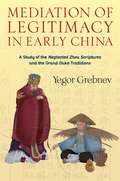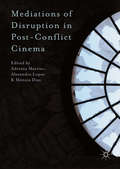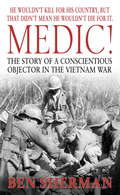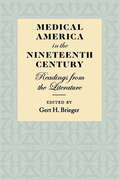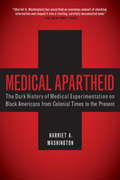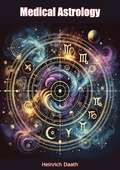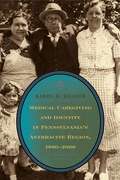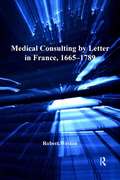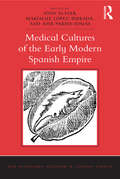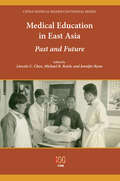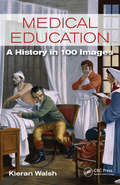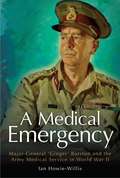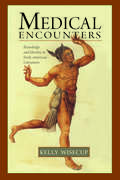- Table View
- List View
Mediated Citizenship
by Bettina Von Lieres Laurence PiperDrawing on case studies from the global South, this book explores the politics of mediated citizenship in which citizens are represented to the state through third party intermediaries. The studies show that mediation is both widely practiced and multi-directional and that it has an important role to play in deepening democracy in the global South.
Mediating Alzheimer's: Cognition and Personhood
by Scott SelbergAn exploration of the representational culture of Alzheimer&’s disease and how media technologies shape our ideas of cognition and aging With no known cause or cure despite a century of research, Alzheimer&’s disease is a true medical mystery. In Mediating Alzheimer&’s, Scott Selberg examines the nature of this enduring national health crisis by looking at the disease&’s relationship to media and representation. He shows how collective investments in different kinds of media have historically shaped how we understand, treat, and live with this disease. Selberg demonstrates how the cognitive abilities that Alzheimer&’s threatens—memory, for example—are integrated into the operations of representational technologies, from Polaroid photographs to Post-its to digital artificial intelligence. Focusing on a wide variety of media technologies, such as neuroimaging, art therapy, virtual reality, and social media, he shows how these cognitively oriented media ultimately help define personhood for people with Alzheimer&’s. Media have changed the practices of successful aging in the United States, and Selberg takes us deep into how technologies like digital brain-training and online care networks shape ideas of cognition and healthy aging.Packed with startlingly fresh insights, Mediating Alzheimer&’s contributes to debates around bioethics, the labor of caregiving, and a national economy increasingly invested in communication and digital media. Probing the very technologies that promise to save and understand our brains, it gives us new ways of understanding Alzheimer&’s disease and aging in America.
Mediating Europe
by Bridgette Wessels Dr Jackie HarrisonThe on-going constitutionalization of Europe has led to various changes in media and communications, opening up areas of debate regarding the role of traditional and new media in developing a specific European public sphere as part of the wider European Project. This timely volume addresses the little understood relationship between old and new media, communications policy at the European level, issues of regulation and competition within the EU, the role of the European Parliament in media policymaking, and the questions emerging about the sustainability of traditional public service broadcasting. To understand the concrete significance of these debates two contributions address specific practical areas, i.e. the potential of online environments and specific developments in European media contexts, such as channel strategies, web-related services, iDTV and community networks. Consequently, Mediating Europe provides an original and important contribution to understanding the role of the media in shaping a European public sphere.
Mediating Mobility: Visual Anthropology in the Age of Migration (Nonfictions)
by Steffen KöhnImages have become an integral part of the political regulation of migration: they help produce categories of legality versus illegality, foster stereotypes, and mobilize political convictions. Yet how are we to understand the relationship between these images and the political in the discourse surrounding migration? How can we, as anthropologists, migration scholars, or documentary filmmakers visually represent people who are excluded from political representation? And how can such visual representations gain political momentum? This volume not only considers the images that circulate with reference to migrants or draw attention to those that accompany, show, or conceal them. The book explores the phenomena of migration with the help of images. It offers an in-depth analysis of the documentary approaches of Ursula Biemann, Renzo Martens, Bouchra Khalili, Silvain George, Raphael Cuomo and Maria Iorio, Alex Rivera, and Rania Stepha, which evoke the particularities of migrant lifeworlds and examine urgent questions regarding the interrelations between politics and poetics, mobility and mediation, and the ethics of probability and possibility. The author also discusses his own cinematic practice in the making of Tell Me When... (2011), A Tale of Two Islands (2012), and Intimate Distance (2015), a trilogy of films that explore the potential to communicate the bodily, spatial, and temporal dimensions of the experience of migration.
Mediating Power-Sharing: Devolution and Consociationalism in Deeply Divided Societies
by Feargal Cochrane Neophytos Loizides Thibaud BodsonThis book focuses on the design and operation of power-sharing in deeply divided societies. Beyond this starting point, it seeks to examine the different ways in which consociational institutions emerge from negotiations and peace settlements across three counter-intuitive cases – post-Brexit referendum Northern Ireland, the Brussels Capital Region and Cyprus. Across each of the chapters, the analysis assesses how the design or mediation of these various forms of power-sharing demonstrate similarity, difference and complexity in how consociationalism has been conceived of and operated within each of these contexts. Finally, a key objective of the book is to explore and evaluate how ideas surrounding power-sharing have evolved and changed incrementally within each of the empirical contexts. The unifying argument within the book is that power-sharing has to have the capacity to adapt to changing political circumstances, and that this can be achieved through the interplay of formal and informal micro-level refinements to these institutions and the procedures that govern them, that allow such institutions to evolve over time in ways that increase their utility as conflict transformation governance structures for deeply divided societies. This book fills the gap in the published literature between theoretical and empirical studies of power-sharing, and will be of much interest to students of peace and conflict studies, consociationalism, European politics and IR in general.
Mediating Spaces: Literature, Politics, and the Scales of Yugoslav Socialism, 1870–1995
by James M. RobertsonThroughout the twentieth century in the lands of Yugoslavia, socialists embarked on multiple projects of supranational unification. Sensitive to the vulnerability of small nations in a world of great powers, they pursued political sovereignty, economic development, and cultural modernization at a scale between the national and the global – from regional strategies of Balkan federalism to continental visions of European integration to the internationalist ambitions of the Non-Aligned Movement.In Mediating Spaces James Robertson offers an intellectual history of the diverse supranational politics of Yugoslav socialism, beginning with its birth in the 1870s and concluding with its violent collapse in the 1990s. Showcasing the ways in which socialists in Southeast Europe confronted the political, economic, and cultural dimensions of globalization, the book frames the evolution of supranational politics as a response to the shifting dynamics of global economic and geopolitical competition. Arguing that literature was a crucial vehicle for imagining new communities beyond the nation, Robertson analyzes the manuscripts, journals, and personal correspondence of the literary left to excavate the cultural geographies that animated Yugoslav socialism and its supranational horizons. The book ultimately illuminates the innovative strategies of cultural development used by socialist writers to challenge global asymmetries of power and prestige.Mediating Spaces reveals the full significance of supranationalism in the history of socialist thought, recovering a key concern for an era of renewed geopolitical contestation in Eastern Europe.
Mediating Violence from Africa: Francophone Literature, Film, and Testimony after the Cold War
by George MacLeodMediating Violence from Africa explores how African and non-African Francophone authors, filmmakers, editors, and scholars have packaged, interpreted, and filmed the violent histories of post–Cold War Francophone Africa. This violence, much of which unfolded in front of Western television cameras, included the use of child soldiers facilitated by the Soviet Union&’s castoff Kalashnikov rifles, the rise of Islamist terrorism in West Africa, and the horrific genocide against the Tutsi in Rwanda. Through close readings of fictionalized child-soldier narratives, cinematic representations of Islamist militants, genocide survivor testimony, and Western scholarship, George S. MacLeod analyzes the ways Francophone African authors and filmmakers, as well as their editors and scholarly critics, negotiate the aesthetic, political, cultural, and ethical implications of making these traumatic stories visible. MacLeod argues for the need to periodize these productions within a &“post–Cold War&” framework to emphasize how shifts in post-1989 political discourse are echoed, contested, or subverted by contemporary Francophone authors, filmmakers, and Western scholars. The questions raised in Mediating Violence from Africa are of vital importance today. How the world engages with and responds to stories of recent violence and loss from Africa has profound implications for the affected communities and individuals. More broadly, in an era in which stories and images of violence, from terror attacks to school shootings to police brutality, are disseminated almost instantly and with minimal context, these theoretical questions have implications for debates surrounding the ethics of representing trauma, the politicization of memory, and Africa&’s place in a global (as opposed to a postcolonial or Euro-African) economic and political landscape.
Mediating in Cyprus: The Cypriot Communities and the United Nations
by Oliver P. RichmondThe UN peacemaking operation in Cyprus has been one of the longest of its kind, but has resulted in discarded proposals, non-papers or reports. This study investigates the Cypriot parties' views of peacemaking, to shed light on the problem, and on the theoretical debates surrounding mediation.
Mediating the South Korean Other: Representations and Discourses of Difference in the Post/Neocolonial Nation-State (Perspectives On Contemporary Korea)
by David C. OhMulticulturalism in Korea formed in the context of its neoliberal, global aspirations, its postcolonial legacy with Japan, and its subordinated neocolonial relationship with the United States. The Korean ethnoscape and mediascape produce a complex understanding of difference that cannot be easily reduced to racism or ethnocentrism. Indeed the Korean word, injongchabyeol, often translated as racism, refers to discrimination based on any kind of “human category.” Explaining Korea’s relationship to difference and its practices of othering, including in media culture, requires new language and nuance in English-language scholarship. This collection brings together leading and emerging scholars of multiculturalism in Korean media culture to examine mediated constructions of the “other,” taking into account the nation’s postcolonial and neocolonial relationships and its mediated construction of self. “Anthrocategorism,” a more nuanced translation of injongchabyeol, is proffered as a new framework for understanding difference in ways that are locally meaningful in a society and media system in which racial or even ethnic differences are not the most salient. The collection points to the construction of racial others that elevates, tolerates, and incorporates difference; the construction of valued and devalued ethnic others; and the ambivalent construction of co-ethnic others as sympathetic victims or marginalized threats.
Mediating the Uprising: Narratives of Gender and Marriage in Syrian Television Drama (Politics of Marriage and Gender: Global Issues in Local Contexts)
by Rebecca JoubinMediating the Uprising: Narratives of Gender and Marriage in Syrian Television Drama shows how gender and marriage metaphors inform post-uprising Syrian drama for various forms of cultural and political critique. These narratives have become complicated since the uprising due to the Syrian regime’s effort to control the revolutionary discourse. As Syria’s uprising spawned more terrorist groups, some drama creators became nostalgic for pre-war days. While for some screenwriters a return to pre-2011 life would be welcome after so much bloodshed, others advocated profound cultural and social transformation, instead. They employed marriage and gender metaphors in the stories they wrote to engage in political critique, even at the risk of creating marketing difficulties for the shows or they created escapist stories such as transnational adaptations and Old Damascus tales. Serving as heritage preservation, Mediating the Uprising underscores that television drama creators in Syria have many ways of engaging in protest, with gender and marriage at the heart of the polemic.
Mediation at the Holocaust Memorial in Berlin
by Irit DekelAnalyzing action at the Holocaust memorial in Berlin, this first ethnography of the site offers a fresh approach to studying the memorial and memory work as potential civic engagement of visitors with themselves and others rather than with history itself.
Mediation of Legitimacy in Early China: A Study of the Neglected Zhou Scriptures and the Grand Duke Traditions (Tang Center Series in Early China)
by Yegor GrebnevScholarship on early China has traditionally focused on a core group of canonical texts. However, understudied sources have the potential to shift perspectives on fundamental aspects of Chinese intellectual, religious, and political history. Yegor Grebnev examines crucial noncanonical texts preserved in the Yi Zhou shu (Neglected Zhou Scriptures) and the Grand Duke traditions, which represent scriptural traditions influential during the Warring States period but sidelined in later history. He develops an innovative framework for the study and interpretation of these texts, focusing on their role in the mediation of royal legitimacy and their formative impact on early Daoism.Grebnev demonstrates the centrality of the Yi Zhou shu in Chinese intellectual history by highlighting its simultaneous connections to canonical traditions and esoteric Daoism. He also shows that the Daoist rituals of textual transmission embedded in the Grand Duke traditions bear an imprint of the courtly environment of the Warring States period, where early Daoists strove for prestige and power, offering legitimacy through texts ascribed to the mythical sage rulers. These rituals appear to have emerged at the same period as the core Daoist philosophical texts and not several centuries later as conventionally believed, which calls for a reassessment of the history of Daoism’s interrelated religious and philosophical strands. Offering a far-reaching reconsideration of early Chinese intellectual and religious history, Mediation of Legitimacy in Early China sheds new light on the foundations of the Chinese textual tradition.
Mediations of Disruption in Post-Conflict Cinema
by Adriana Martins Alexandra Lopes Mónica DiasMediations of Disruption in Post-Conflict Cinema is a transdisciplinary volume that addresses the cinematic mediation of a wide range of conflicts. From World War II and its aftermath to the exploration of colonial and post-colonial experiences and more recent forms of terrorism, it debates the possibilities, constraints and efficacy of the discursive practices this mediation entails. Despite its variety and amplitude in scope and width, the innovative and singular aspect of the book lies in the fact that the essays give voice to a variety of regions, issues, and filmmaking processes that tend either to remain on the outskirts of the publishing world and/or to be granted only partial visibility in volumes of regional cinema.
Medic!: The Story of a Conscientious Objector in the Vietnam War
by Ben Sherman"On the firing range during the third week of Advanced Individual Training, I put down the handgun I had been assigned and stood back from the shooting podium. The sergeant barked something barely intelligible about six years in Leavenworth Federal Prison for refusing a direct order. I repeated that I wasn't going to train myself to kill anybody. Like falling dominoes, every soldier on the range stopped to turn and look at me. The sergeant called me a coward. I said again that I wasn't going to shoot the pistol. . . " In August 1968, Ben Sherman - then an eighteen year old college sophomore - was drafted, yet another Midwestern boy called to serve his country in the rice paddies of Vietnam. After his attempt for conscientious objector status was refused by the draftboard, Sherman distinguished himself almost immediately upon entering the military: he refused to fire a weapon. Instead, he told his superior officers that he was willing to serve in any capacity that would not require him to carry a gun. Within a few short weeks he found himself in swamps of Vietnam, working as a combat medic. From his start in the morgue, cleaning the bodies of fallen soldiers before they were sent home for burial, to operating on dying men while under front line fire, Sherman's story captures the sounds, smells, and terror of Vietnam as experienced by so many American soldiers who ended up in Vietnam without wanting to be there. Written with a rare combination of humor, honesty,and intelligence, Medic offers a glimpse into a world where unrelenting pressure and unbearable circumstances were common-place, where heroes fell on the battlefield daily, and where one man struggled to keep his conscience clear in the face of unspeakable horror.
Medical America in the Nineteenth Century: Readings from the Literature
by Gert H. BriegerStudents of the history of medicine and of American history in general will welcome this collection of thirty papers originally published in nineteenth-century medical journals and lay publications. Each highlights a specific problem or medical attitude of the period, and together they present an illuminating panorama of the medical profession and of public health in nineteenth-century America. Many of the problems faced by students, practitioners, and patients of the last century are surprisingly similar to those still being encountered today.Dr. Brieger has selected papers that illustrate the issues and developments in medical education, medical practice, surgery, hospitals, hygiene, and psychiatry. They range from Benjamin Rush's "On the Cause of Death in Diseases That Are Not Incurable," to a paper by Robert F. Weir "On the Antiseptic Treatment of Wounds, and Its Results" and an article by Stephen Smith, "New York the Unclean." The final selection, the Announcement of The Johns Hopkins Medical School, stands as a landmark that foretells the beginning of a new era.
Medical Apartheid: The Dark History of Medical Experimentation on Black Americans from Colonial Times to the Present
by Harriet A. WashingtonNATIONAL BOOK CRITICS CIRCLE AWARD WINNER • The first full history of Black America&’s shocking mistreatment as unwilling and unwitting experimental subjects at the hands of the medical establishment. No one concerned with issues of public health and racial justice can afford not to read this masterful book."[Washington] has unearthed a shocking amount of information and shaped it into a riveting, carefully documented book." —New York TimesFrom the era of slavery to the present day, starting with the earliest encounters between Black Americans and Western medical researchers and the racist pseudoscience that resulted, Medical Apartheid details the ways both slaves and freedmen were used in hospitals for experiments conducted without their knowledge—a tradition that continues today within some black populations.It reveals how Blacks have historically been prey to grave-robbing as well as unauthorized autopsies and dissections. Moving into the twentieth century, it shows how the pseudoscience of eugenics and social Darwinism was used to justify experimental exploitation and shoddy medical treatment of Blacks. Shocking new details about the government&’s notorious Tuskegee experiment are revealed, as are similar, less-well-known medical atrocities conducted by the government, the armed forces, prisons, and private institutions. The product of years of prodigious research into medical journals and experimental reports long undisturbed, Medical Apartheid reveals the hidden underbelly of scientific research and makes possible, for the first time, an understanding of the roots of the African American health deficit. At last, it provides the fullest possible context for comprehending the behavioral fallout that has caused Black Americans to view researchers—and indeed the whole medical establishment—with such deep distrust.
Medical Astrology
by Heinrich Daath"Medical Astrology" by Heinrich Daath is an authoritative and illuminating exploration of the ancient practice of using astrology to understand and influence health and well-being. Daath, a distinguished astrologer and scholar, bridges the gap between traditional astrological wisdom and modern medical knowledge, offering readers a comprehensive guide to the principles and applications of medical astrology.In this profound work, Daath delves into the intricate relationships between the celestial bodies and human health. He explains how the positions and movements of the planets can affect physical and mental health, providing insights into the underlying causes of various ailments and conditions. Through detailed explanations and practical guidance, Daath demonstrates how to interpret astrological charts to gain a deeper understanding of individual health profiles and potential predispositions."Medical Astrology" also includes historical context, tracing the roots of medical astrology in various cultures and highlighting its evolution and relevance in contemporary holistic health practices. Daath emphasizes the importance of integrating astrological insights with modern medical knowledge to achieve a balanced and effective approach to health and healing.Heinrich Daath's "Medical Astrology" is a must-read for astrologers, holistic health practitioners, and anyone interested in the powerful connections between the cosmos and human health. It stands as a testament to the enduring wisdom of medical astrology and its potential to enhance our understanding of health and well-being.
Medical Caregiving and Identity in Pennsylvania's Anthracite Region, 1880–2000
by Karol K. WeaverWhile much has been written about immigrant traditions, music, food culture, folklore, and other aspects of ethnic identity, little attention has been given to the study of medical culture, until now. In Medical Caregiving and Identity in Pennsylvania’s Anthracite Region, 1880–2000, Karol Weaver employs an impressive range of primary sources, including folk songs, patent medicine advertisements, oral history interviews, ghost stories, and jokes, to show how the men and women of the anthracite coal region crafted their gender and ethnic identities via the medical decisions they made. Weaver examines communities’ relationships with both biomedically trained physicians and informally trained medical caregivers, and how these relationships reflected a sense of “Americanness.” She uses interviews and oral histories to help tell the story of neighborhood healers, midwives, Pennsylvania German powwowers, medical self-help, and the eventual transition to modern-day medicine. Weaver is able to show not only how each of these methods of healing was shaped by its patrons and their backgrounds but also how it helped mold the identities of the new Americans who sought it out.
Medical Consulting by Letter in France, 1665–1789 (The History of Medicine in Context)
by Robert WestonAiling seventeenth- and eighteenth-century French men and women, members of their families, or their local physician or surgeon, could write to high profile physicians and surgeons seeking expert medical advice. This study, the first full-length examination of the practice of consulting by letter, provides a cohesive portrayal of some of the widespread ailments of French society in the latter part of the early modern period. It explores how and why changes occurred in the relationships between those who sought and those who provided medical advice. Previous studies of epistolary medical consulting have limited attention to the output of one or two practitioners, but this study uses the consultations of around 100 individual practitioners from the mid-seventeenth century to the time of the Revolution to give a broad picture of patients and physicians perceptions of illnesses and how they should be treated on a day-to-day basis. It makes a unique contribution to the history of medicine, as no other study has been undertaken in the consulting by letter of surgeons, as opposed to physicians. It is shown that the well-known disputation between physicians and surgeons tells only a part of the history; whereas in fact, necessity required that these two 'professions' had to work together for the patients' good.
Medical Cultures of the Early Modern Spanish Empire (New Hispanisms: Cultural and Literary Studies)
by John Slater Maríaluz López-Terrada José Pardo-TomásEarly modern Spain was a global empire in which a startling variety of medical cultures came into contact, and occasionally conflict, with one another. Spanish soldiers, ambassadors, missionaries, sailors, and emigrants of all sorts carried with them to the farthest reaches of the monarchy their own ideas about sickness and health. These ideas were, in turn, influenced by local cultures. This volume tells the story of encounters among medical cultures in the early modern Spanish empire. The twelve chapters draw upon a wide variety of sources, ranging from drama, poetry, and sermons to broadsheets, travel accounts, chronicles, and Inquisitorial documents; and it surveys a tremendous regional scope, from Mexico, to the Canary Islands, the Iberian Peninsula, Italy, and Germany. Together, these essays propose a new interpretation of the circulation, reception, appropriation, and elaboration of ideas and practices related to sickness and health, sex, monstrosity, and death, in a historical moment marked by continuous cross-pollination among institutions and populations with a decided stake in the functioning and control of the human body. Ultimately, the volume discloses how medical cultures provided demographic, analytical, and even geographic tools that constituted a particular kind of map of knowledge and practice, upon which were plotted: the local utilities of pharmacological discoveries; cures for social unrest or decline; spaces for political and institutional struggle; and evolving understandings of monstrousness and normativity. Medical Cultures of the Early Modern Spanish Empire puts the history of early modern Spanish medicine on a new footing in the English-speaking world.
Medical Education in East Asia: Past and Future (China Medical Board Centennial Series)
by Lincoln C. Chen, Michael R. Reich, and Jennifer RyanPivotal to Asia's future will be the robustness of its medical universities. Lessons learned in the past and the challenges facing these schools in the future are outlined in this collection, which offers valuable insights for other medical education systems as well. The populations in these rapidly growing countries rely on healthcare systems that can vigorously respond to the concerns of shifting demographics, disease, and epidemics. The collected works focus on the education of physicians and health professionals, policy debates, cooperative efforts, and medical education reform movements.
Medical Education: A History in 100 Images (Oxford Textbook Ser.)
by Kieran WalshThis fascinating guide to medical education introduces the reader to the historical development of this important subject through 100 powerful images from the prestigious Wellcome Library Collection that highlight key figures in the field and innovations that have taken place, not just in the recent past but over the centuries. The readable text that accompanies each image both describes that image and shows how the ideas arising from it have helped to shape modern medical education, with relevance to current clinical practice. This will be an invaluable and visual introduction for students, academics, managers and practitioners looking to gain a better understanding of the evolution of educational practice in medicine, and how it might progress in the future.
Medical Emergency: Major-General 'Ginger' Burston and the Army Medical Service in WW II (Big Sky Publishing Ser.)
by Ian Howie-WillisMajor-General `Ginger' Burston led the Army Medical Service throughout the Pacific campaigns. This pivotal book explains how Burston and his medical team kept Allied troops healthy in primitive and hostile conditions and during the greatest medical emergency of World War II - the struggle against malaria. By keeping the soldiers healthy, and particularly by reducing malaria infection rates from 100 to less than one case per 1000 troops per week, the Army Medical Service assured an Allied victory over Japan. A Medical Emergency tells this remarkable story for the first time. In engrossing detail and using contemporary accounts, veteran historian Ian Howie-Willis brings to life the struggle of `Ginger' Burston and his Medical Service to fight a deadly opponent that decimated the ranks of friend and foe alike. Their victory was key to the ultimate Allied success.
Medical Encounters: Knowledge and Identity in Early American Literatures
by Kelly WisecupThe conquest and colonization of the Americas resulted in all kinds of exchanges, including the transmission of diseases and the sharing of medicines to treat them. In this book, Kelly Wisecup examines how European settlers, Native Americans, and New World Africans communicated medical knowledge in early America, and how the colonists represented what they learned in their literatures. Against the prevailing view that colonial texts provide insight only into their writers' perspectives, Wisecup demonstrates that Europeans, Natives, and Africans held certain medical ideas in common, including a conception of disease as both a spiritual and a physical entity, and a belief in the power of special rituals or prayers to restore health. As a consequence, medical knowledge and practices operated as a shared form of communication on which everyone drew in order to adapt to a world of devastating new maladies and unfamiliar cures. By signaling one's relation to supernatural forces, to the natural world, and to other people, medicine became an effective means of communicating a variety of messages about power and identity as well as bodies and minds. Native Americans in Virginia and New England, for example, responded to the nearly simultaneous arrival of mysterious epidemics and peoples by incorporating colonists into explanations of disease, while British American colonists emphasized to their audiences back home the value of medical knowledge drawn from cross-cultural encounters in the New World.
